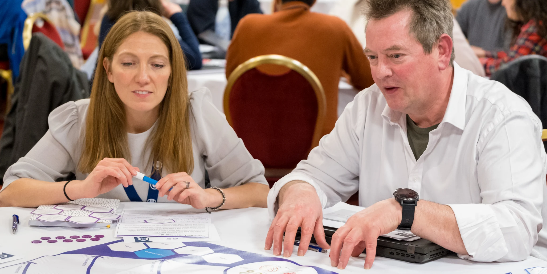Cranfield wins Financial Times teaching award for business sustainability game

A role-playing game to develop strategic decision-making skills and explore paths to a sustainable future is one of the winners in the 2025 Financial Times Responsible Business Education Awards. Cranfield School of Management’s Exploring Sustainable Futures Game – showcased at COP26 in Glasgow - has been played by over 2,500 people since it was developed in 2018 with students, sustainability practitioners and business executives building skills from game-based learning. The game won in the Best Business School Teaching Materials based on Innovative Research category.
“The problems we face as a global community are now so complex that the skills we’ve taught in the past may not get the cut through needed,” says Dr Rosina Watson, Associate Professor of Sustainability at Cranfield School of Management and co-creator of the Exploring Sustainable Futures game.
“Our game takes a radical approach to building systems thinking and collaborative leadership abilities, and gets people learning in a really fresh and interesting way. It’s developing change agents through four key principles: convening an ecosystem, shifting time horizons, making ‘business as usual’ untenable, and freeing players from preconceived ideas and role identities.”
A glance into the future builds understanding
In the game, groups of learners ‘time-travel’ forwards to 2050 and experience how alternative futures unfold based on decisions they have made in assumed roles such as entrepreneurs, civil society organisations, policy makers and the public. The game enhances players’ understanding of the relationship between business and society, and how collective change occurs.
“This learning experience is different. It gives people a safe space to practice exercising their agency to create sustainable transitions – as individuals, as members of organisations and collectively as an industry ecosystem. We’re allowing participants to break free from assumptions about an organisation’s role, re-imagine the structure of an ecosystem, and renegotiate each organisation’s role within that structure,” continues Dr Watson.
“With greater awareness and alignment of their attitudes, values and working relationships, players build agency in creating real change – and that’s something the real world really needs.”
Megan Kashner — one of the judges for the awards, and director of social impact and sustainability at Northwestern University’s Kellogg School of Management commented that the game is “based on sound research and academic inquiry, and has been tested and used in postgraduate education, among other applications.”
Cranfield’s Exploring Sustainable Futures game was developed in collaboration with Gemma Adams (Beeworx), Professor Emma Macdonald (Strathclyde Business School), Professor Hugh Wilson (Warwick Business School) and the Cranfield University game team - Caroline Harris, Gabriela Pearson and Zoe Lynch.
The Financial Times Responsible Business Education Awards are now in their third year, showcasing innovative approaches to tackling global challenges such as sustainability and climate change.





